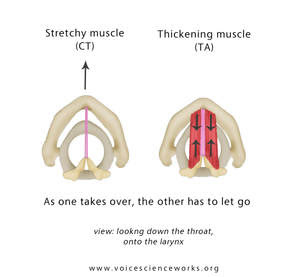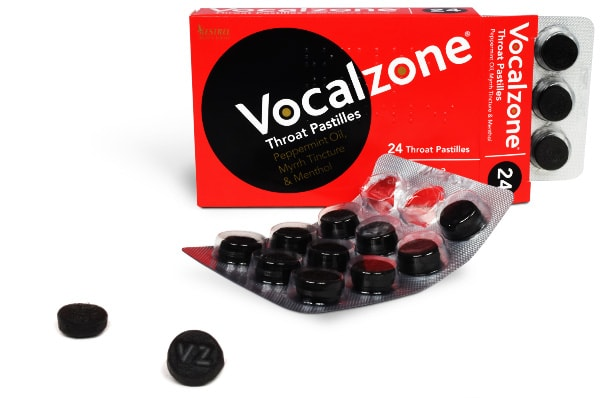Let’s get this out of the way: if your voice cracks while singing, it doesn’t mean you’re doomed to karaoke purgatory. Whether you call it a voice crack, voice cracked moment, or just cracking voice, it’s common, especially when you’re learning.
You’re human, and learning an instrument that just happens to be attached to your body.
Even Beyoncé has had a rogue squeak mid-tour. Voice cracks aren’t proof you’re a bad singer; they’re your vocal folds waving a tiny white flag saying, “Something’s off, help us out.”
This guide is here to show you what’s actually happening when that dreaded cracking voice sneaks in, why it happens, and how to fix it, without losing your sanity or your love of singing.
We’ll talk physiology, psychology, and even the messy beauty of imperfection. And yes, you’ll walk away with exercises to stop voice cracking, plus a few mindset shifts so you don’t freak out every time it happens.
(By the way, if you want a hands-on fix for voice cracks, sign up for voice lessons at Angeles Academy of Music. A good teacher can save you months of trial-and-error.)
What a Voice Crack Actually Is (and Why It’s Not the End of the World)
Imagine your voice as a bridge between two cities: chest voice on one side, head voice on the other. The middle, called the passaggio, is where most cracks set up camp.
Physiologically, a voice crack is when your vocal folds momentarily lose coordination and the sound flips or drops out. Inside your larynx, two muscle teams negotiate:
- The thyroarytenoid (TA) muscles handle chest voice: thicker, heavier vibration.
- The cricothyroid (CT) muscles stretch the folds thin for head voice.

A crack happens when that handoff is clumsy: the TA lets go too fast, the CT over-corrects, and boom. Sonic hiccup. Smooth register changes rely on a good “mix,” like shifting gears in a car without grinding.

Next, many students ask:
“Are voice cracks normal when singing?”
The answer is yes.
Cracks usually pop up in predictable spots: around E4–F4 for many men, A4–B4 for women. That doesn’t mean you’re cursed with a bad range. It just means you’re hitting the natural switch point before your muscles have learned to balance there.
In short, voice cracks while singing (or a singing voice cracking unexpectedly) happen when your folds can’t quite agree on how to handle the pitch shift.
Why Does My Voice Crack When I Sing? What Causes Voice Cracks
When people ask “why is my voice cracking,” the culprits are usually a messy cocktail of technique, biology, and sometimes nerves. Here’s the greatest hits list:
- Register Transition Drama: The passaggio is where most beginners trip. Without a developed mixed voice, your sound jumps from chest to head like a skateboarder missing the ramp.
- Pushing Chest Voice Too High: Hauling heavy vocal weight up to high notes is like trying to deadlift a piano. Eventually, your folds tap out.
- Too Much Air Pressure: Belting a note with a fire-hose breath supply can blow the folds apart mid-phrase. Support should feel buoyant, not like bracing for a tsunami. (Our post on breathing techniques for singing digs deeper.)

- Tension in the Throat/Jaw: If your neck veins look like roadmaps when you hit a chorus, you’re strangling the sound. Relax that jaw; your larynx will thank you.
- Dropping Support at the Cliff: Some singers hold breath support beautifully… right until the high note, then they bail. Keep your core engaged through the “scary” pitch.
- Over-Compression: Squeezing the vocal folds shut in fear of a crack ironically causes one. Ease off the death grip.
- Puberty & Hormones: Teenagers, your changing voice isn’t broken. It’s remodeling. Even adults can get wobbly if hormones, illness, or fatigue kick in.
- Dryness, Fatigue, Illness: Tired or dehydrated folds are slippery slopes. Warm water and rest work better than panic.
- Stage Fright: Anxiety dries out the throat and tightens muscles. The more you dread a crack, the more likely it shows up.
None of these spells doom. They’re just clues. Fix the cause, and the crack goes quiet.
Parents FAQs
Should my child stop singing if their voice keeps cracking?
No. Stopping lessons won’t prevent cracks. It usually delays healthy development. Cracking is part of the voice “finding balance” between registers.
Under teacher supervision, continuing lessons helps your child build coordination and confidence. If cracks are paired with pain, breathiness lasting weeks, or voice loss, that’s when to consult a pediatric ENT.
Is cracking more serious for boys than girls?
Both boys and girls experience cracks, though they may sound more dramatic in boys due to the larger laryngeal growth during puberty. Girls typically have subtler shifts in their passaggio (bridge). Neither is harmful in most cases.
Can voice cracks permanently damage my child’s voice?
The crack itself does not damage the voice. What can cause issues is straining through the crack, like forcing volume, tightening the throat, or yelling. That’s why guided singing with proper warm-ups, breath support, and hydration is protective. Think of cracks as “alerts,” not injuries.
What if my child has a light sore throat and is cracking more often?
A mildly sore throat makes the vocal folds less stable, so cracks may increase. Ensure your child drinks water, rests their voice, and avoids shouting. Herbal teas or mild lozenges (like honey-ginger) can soothe irritation. If soreness or hoarseness lasts longer than 7–10 days, check with a doctor to rule out infection or reflux.
Beginners vs. Pros: Who’s Safe From Cracks?
Short answer: nobody. Long answer: pros just manage them better. Even professionals sometimes experience voice cracks when singing live; the difference is that they don’t spiral when it happens.
A beginner might freeze when a note splits; a pro shrugs, keeps singing, maybe even makes it sound soulful.

Legendary singers, from Adele to Sam Smith, have had nights where their voices misbehaved. What sets them apart isn’t immunity; it’s poise, preparation, and relentless training.
They’ve logged hours mastering breath, resonance, and that mysterious “mix.” But even the best can crack if they’re sick, overtired, or pushing limits.
So don’t buy into the myth that voice cracks are a beginner’s curse. They’re a human thing. With practice, guidance, and smart technique, you can make them rare and recover fast when they do appear.
FAQ: Why does my voice crack at high notes, and how can I prevent it?
High notes demand thinner, more stretched vocal folds. If you try to carry a heavy chest voice too far or overshoot with air pressure, you risk a cracking on top.
Building a solid mixed voice, easing breath pressure, and staying hydrated are the best answers to how to stop voice cracks when singing high.
We will explore this further in the next section.
How to Stop Voice Cracking: Practical Tools and Exercises
If you only remember one thing from this section, let it be this: you don’t “beat” voice cracks while singing by sheer willpower. You outsmart them with good habits and clever drills. Below are techniques used by vocal coaches worldwide, including the tips hidden in those YouTube transcripts and training docs you sent over.
1️⃣ Lip Trills (aka Lip Bubbles)
Blow air through relaxed lips to make a light “brrr,” sliding from low to high and back. Lip trills keep airflow steady and pressure gentle. Perfect for smoothing out that cracking voice zone.
Pro tip: if trilling feels impossible, start with a tongue roll or a soft “mmm” hum. The goal is easy resistance, not brute force.
2️⃣ The Bratty “Nay Nay”
Say “nay” like an overconfident cartoon witch. (Think “nay-nay-nay!” with attitude.) This bright, nasal placement anchors your chest register while letting you thin it out at the top. It’s the gateway drug to a stable mix, and it keeps you from muscling up the passaggio.
3️⃣ The “Yummy Hum”
Pretend you’re savoring chocolate cake and humming “mmm.” That playful chew-and-hum trick frees the jaw and throat while balancing cord closure. Use it on sirens or scales that normally betray you. The hum teaches your folds how to stay connected without clamping
4️⃣ Find Your Mixed Voice
Mastering this placement is the ultimate fix for a voice crack singing disaster mid-song.
Aim the resonance “just below your eyes,” as one coach puts it, and glide slowly through middle notes. When the buzz feels even, not chesty, not floaty, you’ve found your bridge.
- Try gentle sirens on “oo” or “ee.”
- Experiment with a small puppy-dog whimper at the top to coax head voice without a flip.
- Or speak a tricky phrase on pitch first, then sustain it. A neat way to bypass overthinking.
5️⃣ Vowel Tuning
High notes hate wide, rigid vowels. Adjust them slightly (“me” → “mih,” “cat” → “ket/kuh”) as you ascend. This tiny vowel shaping keeps the throat open, helping you avoid that splat-and-crack moment.
6️⃣ Support Without Squeezing
Breath support isn’t about inflating like a balloon or clenching abs till you see stars. Keep the ribs expanded and airflow steady, even as the note rises. Straw phonation (singing through a straw) is a great “reset button” if you start to strain.
(Need more help with airflow? Check out our guide on breathing techniques for singing.)
7️⃣ Relaxation + Mindset Hacks
A lot of “fixing” voice cracks is fixing how you feel about them. Anxiety tightens everything: throat, jaw, even your thinking. Before practice, roll your shoulders, stretch your neck, and take a deep breath. If a note splinters mid-song, don’t freeze; treat it like a pothole you already knew was there.
Cracks aren’t personal. They’re feedback. Laugh, adjust, keep going.
8️⃣ Hydrate and Rest
Your voice is tissue, not titanium. Keep water handy, get decent sleep, and avoid marathon talking before gigs. If you live somewhere dry (hello, LA), a humidifier or quick steam session works wonders.
9️⃣ Throat Lozenges: What Helps, What Doesn’t, and Some Trusted Brands
When your throat is scratchy, dry, or you have a performance coming up, a good lozenge can be a relief. However, they don’t solve the core issues of bacteria or infections.
But not all lozenges are created equal. Some are helpful, some are not ideal for singing. Good brands you can go for: Vocalzone, Grether’s, ACT, Vocal Eze, and Strepsils.

Why Lessons Speed Things Up
Could you DIY all this from blog posts and videos? Sure. Will it take longer (and involve more swearing at rogue squeaks)? Also yes. A teacher spots habits you don’t even know you have, like clenching your tongue base or blasting too much air at high notes.
That’s why so many students at Angeles Academy come in stuck and leave with smooth bridges. If you’re ready to conquer voice cracking while singing for good, consider booking a voice lesson. You’ll get personalized strategies, instant feedback, and someone to remind you that a crack isn’t a character flaw.
The “Perfectly Imperfect” Voice
By now, you’ve got the science and the drills for voice cracks while singing. But there’s a third layer: how you think about cracks.
A lot of students freeze when a note splinters, as if the universe just rated their talent a zero. That reaction is the real saboteur, not the crack itself. Performance anxiety dries your mouth, tightens your larynx, and invites exactly what you’re scared of. It’s a nasty little loop.
Cracks are telling you, “Hey, your breath sagged,” or “You’re hauling too much chest.” Treat it like a GPS rerouting, not a moral failure.
And sometimes, that break in your voice? It’s emotion spilling through. Think of Billie Eilish’s fragile upper notes, or when Sam Smith lets their voice fracture on a heartbreak lyric. Those moments hit because they’re raw. They remind us we’re listening to a human, not a machine.
As one of my mentors loves to say: “A little imperfection is often the most perfect part of music.”
So keep your technique sharp, but don’t iron every ounce of personality out of your sound. Artistry lives in the balance between control and surrender.
Putting It All Together
Here’s your action plan for tackling a cracking voice while singing:
- Warm up daily. Even five minutes of lip trills or “nay-nay-nays” will prep your folds.
- Practice slides through your passaggio slowly, not like you’re storming a fortress.
- Keep hydrated, rested, and kind to your voice.
- When you feel that fear creep in, breathe, smile, and keep going.
And above all: keep singing. Skills grow from repetition, not avoidance. Every crack you troubleshoot builds more muscle memory and more self-trust.
If you want faster, tailored results, let an expert guide you. Our teachers at Angeles Academy specialize in smoothing out the “break” and helping students of all levels build steady, confident voices.
Sign up for voice lessons and give yourself the gift of clarity, plus someone in your corner cheering when that once-scary note finally comes out flawless.
Final Note
Voice cracks don’t mean you’re broken. They mean you’re learning an instrument that lives inside your body, and like any instrument, it needs time, care, and smart technique. Whether you’re chasing Broadway, a recording career, or just want to nail that high note in the car, the path is the same: respect your instrument, practice the right stuff, and enjoy the ride.
Sing bravely. Sing smart. And if a note goes rogue? Smile, regroup, and keep going, because the best singers aren’t the ones who never crack. They’re the ones who turn cracks into confidence.
Contributed by: Marina G, (BM, UCLA: University of California Los Angeles, Vocal Performance) (Angeles Academy of Music - Senior Voice Instructor)
.svg)
.svg)
.svg)
.svg)
.svg)
.svg)





.svg)